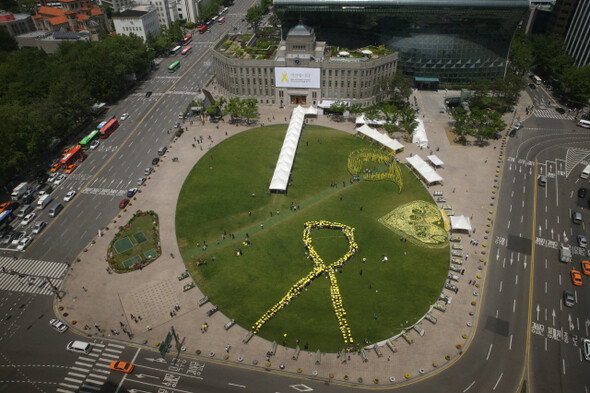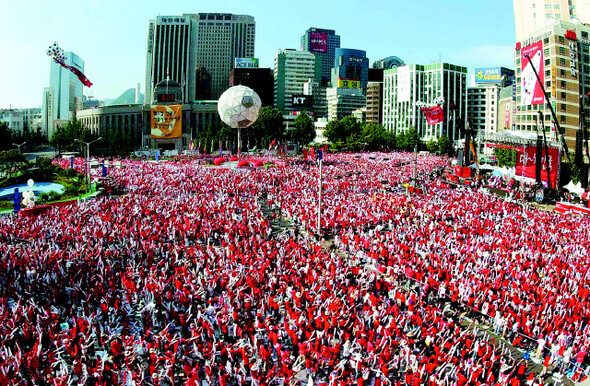hankyoreh
Links to other country sites 다른 나라 사이트 링크
[Column] Let's empty the plazas!

By Jung Yoon-soo, Sports Culture Critic
I went to Ansan. An oppressive heaviness lay over the Memorial Altar for the victims of the Sewol Ferry disaster. The moment I approached the altar, I felt a violent shudder pass through my body. It was hard to move forward. After I lit the incense sticks, I left the building and sat outside in the shade for a long time. Various thoughts simultaneously swept over and then receded away. Amid the heavy silence, I thought about the World Cup. I was thinking about the chant, repeated on the TV and in the papers, “Republic of Korea, we are becoming one!”
“The masses are unalterable. It is one of the most momentous facts of social science. PANEM ET CIRCENSES [bread and circuses]!”
Who was it that cited this? Was it Hitler, the embodiment of Fascism? Pinochet, the symbol of iron-fisted rule? Was it the people who cruelly disparaged the bereaved families as “uncivilized” and questioned whether they were “pure bereaved families”? Former FIFA President Joao Havelange, who injected ethnic nationalism into a soccer ball? To be sure, this was the general sentiment of the middle and upper classes that ruled Europe in the modern period. The sentence above is found in DH Lawrence’s novel, “Lady Chatterley‘s Lover.”
The novel is set in a mining village in Derbyshire. That’s right. This is the region that gave birth to the derby match, a heated game between rival teams from within the same city, any football fan will be familiar with. In mining villages, football culture served as an emotional outlet for both the seasonal customs of the Middle Ages and battles fought during the period of territorial expansion.
Even now, the Royal Shrovetide Football Match takes place in Ashbourne, Derbyshire. It is a competition between young people from the village, divided into teams according to which side of the river they are from, with the whole village serving as the field of play. The two goals are 5 km apart; No wonder they came up with the term “derby match.”
Did everyone share this popular fervor? No, they did not. In DH Lawrence novels, “Lady Chatterley‘s Lover” and “Sons and Lovers,” he depicts the gloomy landscape in the mining district and the emotional struggle between classes DH Lawrence himself might have experienced being a son of a miner.
Lady Chatterley’s husband, Clifford Chatterley is the descendant of an illustrious family and a wealthy mine owner, and he awakens to the frightening realization that his world is being threatened by progressive ideas circulating among the masses. Lawrence writes about Clifford, “If the truth must be told, he was just a little bit frightened of middle-and lower-class humanity[. . .] He was, in some paralysing way, conscious of his own defencelessnes.”
So what did they do? Did they bitterly withdraw behind the curtain of history? No, they did not. They figured that bread and circuses would be enough. Let us listen to a little more of what Lord Chatterley had to say: “The masses have been ruled since time began, and till time ends, ruled they will have to be.” So they used the carrot and the stick. They thought they would be able to control the emotions of the masses through those methods.
At various points in 20th century history, football has been used as an effective method of emotional control. In England, Argentina, and Afghanistan, we can perceive the dark history in which domination of the masses was achieved through the emotional control afforded by the football field. If we try to hard enough, we can remember how this has happened in South Korea as well.
Even worse, there have been many “uncivilized” politicians who have attempted to rise to power in the bid to host the World Cup, an event tainted with nationalism and commercialism. Such politicians believe if they control the emotions on the football field, they can control the country. It seems their efforts have been successful.
Returning to the novel, Lord Chatterley is filled with fear even as he talks of the necessity of controlling the masses. Football was part of the bread and circuses strategy, but the masses kicked the ball in a completely different direction.
The masses were “no longer the stagnant pool” and had “shaken off [their] torpid despair [and] returned to life,” Friedrich Engels had written in “The Condition of the Working-Class in England in 1844.” Cultural theorist Raymond Williams in the “The Country and the City” spoke of “the great civilising response to industrial tyranny and anarchy.” For the low and middle classes in Manchester, Sunderland, Newcastle, and Liverpool, football was another name for the battle of the emotions. For example, when Margaret Thatcher, the former Prime Minister of the UK and bastion of neoliberalism who ravaged the mining districts, passed away in April 2013, England‘s The Football Association, cancelled a memorial service for Thatcher before the game on the grounds that she had insulted the passion of the masses who gathered at the football field.
Since The Football Association had held memorial services to mark the passing of famous figures, it was not an easy decision to make, but it was a dignified one. Thatcher had insulted the common people at football stadiums and demonstrations as being “hooligans” and an “embarrassment to civilized society.”
It is clear that football can represent other values, and the World Cup can channel other emotions. Unlike the distorted image presented by Western media, Diego Maradona resisted corruption in Argentina, and Pele fought against organized power or rather Havelange, former FIFA president and head of the Brazil Football Association.
It is clear that there exist emotions that are imperceptible and a history that is inconceivable to those in the VIP seats, who all too easily mistake the shouts of “Republic of Korea” as slogans of support for themselves. The crowds chant “Republic of Korea,” but it contains a complicated mixture of the suffering and conflict of the age, and the loneliness and anxiety of the individual. The powers that be, along with many broadcasters and news media, take great pains to ignore this.

After the Sewol disaster, efforts have been made in various places to exert emotional control, ordering people to “stay still.” Those responsible for the long-standing evils that need to be reformed are in fact calling for “national restoration,” and place an emphasis on returning to a “pure Korea.” When it comes to the Sewol ferry tragedy, we are told to “stay still,” but when it comes to the World Cup, we are told to “stand up.” A hundred years after Lord Chatterley, there are still far too many people of his ilk who believe it is possible to control the people’s emotions and to rule them through the events like the World Cup that have risen in prominence through nationalistic fervor.
I remember many footballers, including Coach Hong Myung-bo, visiting the memorial altar. Needless to say, we support the Korean team and hope that they win. Even so, there is no need to create the spectacle of “becoming one” through large-scale participation in a flashy event. It is fine to gather in the street to support a team, but we must not be caught up in the elaborate pass play organized by FIFA, capital, and TV broadcasters.
Enflamed with the desire to increase viewer ratings, TV stations will put on a fancy show. The politicians plotting for “national restoration” will be delighted to hear the crowds sharing the same slogans. They will castigate those who refuse to join in, demanding whole-hearted team support while just as afraid of the passion of the masses as Lord Chatterley was. At times like this, the word “pure” can indeed be violent.
There are times when people gather together in smaller groups to cheer in a more subdued way. Now is one of those times. This June, let us keep the streets and plazas empty on behalf of those who are grieving. This time, we must empty the plazas. Everyone would be shocked. Politicians would be shocked. The world will be shocked. If all were shocked in 2002 because the plazas were completely full, they will be shocked this time because they are completely empty. Those who keep talking about “national restoration” and are looking forward to the shouts of “Republic of Korea” will be afraid. The unheard cheering will be louder than the cheers; the unseen faces of the people will be plain to see.
We are not the sort of people who stay still when they tell us to stay still and who stand up and shout “Republic of Korea” when they tell us to stand up. Let's empty the plazas. The empty plazas could be filled with the spirit of infinite friendship and intense solidarity. The plazas would then be truly beautiful.
The views presented in this column are the writer’s own, and do not necessarily reflect those of The Hankyoreh.Please direct questions or comments to [english@hani.co.kr]
Editorial・opinion
![[Editorial] Does Yoon think the Korean public is wrong? [Editorial] Does Yoon think the Korean public is wrong?](https://flexible.img.hani.co.kr/flexible/normal/500/300/imgdb/original/2024/0417/8517133419684774.jpg) [Editorial] Does Yoon think the Korean public is wrong?
[Editorial] Does Yoon think the Korean public is wrong?![[Editorial] As it bolsters its alliance with US, Japan must be accountable for past [Editorial] As it bolsters its alliance with US, Japan must be accountable for past](https://flexible.img.hani.co.kr/flexible/normal/500/300/imgdb/original/2024/0417/6817133413968321.jpg) [Editorial] As it bolsters its alliance with US, Japan must be accountable for past
[Editorial] As it bolsters its alliance with US, Japan must be accountable for past- [Guest essay] Amending the Constitution is Yoon’s key to leaving office in public’s good graces
- [Editorial] 10 years on, lessons of Sewol tragedy must never be forgotten
- [Column] A death blow to Korea’s prosecutor politics
- [Correspondent’s column] The US and the end of Japanese pacifism
- [Guest essay] How Korea turned its trainee doctors into monsters
- [Guest essay] As someone who helped forge Seoul-Moscow ties, their status today troubles me
- [Editorial] Koreans sent a loud and clear message to Yoon
- [Column] In Korea’s midterm elections, it’s time for accountability
Most viewed articles
- 1Samsung barricades office as unionized workers strike for better conditions
- 2[Column] The clock is ticking for Korea’s first lady
- 3[Editorial] When the choice is kids or career, Korea will never overcome birth rate woes
- 4Why Israel isn’t hitting Iran with immediate retaliation
- 5[News analysis] After elections, prosecutorial reform will likely make legislative agenda
- 6S. Korea, Japan reaffirm commitment to strengthening trilateral ties with US
- 7Japan officially says compensation of Korean forced laborers isn’t its responsibility
- 8[Editorial] As it bolsters its alliance with US, Japan must be accountable for past
- 9[Editorial] Does Yoon think the Korean public is wrong?
- 10[Guest essay] How Korea turned its trainee doctors into monsters